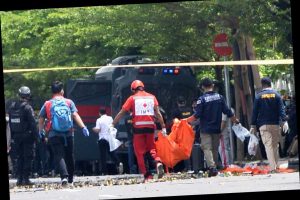Suicide bomb hits Palm Sunday Mass in Indonesia, 20 wounded

More On:
indonesia
Once called crazy, Indonesian eco-warrior turns arid hills green
Indonesian girls traumatized by push to wear hijab, rights group says
Indonesia bus crash kills 27, including children
Indonesia’s Sinabung volcano unleashes new burst of hot ash
MAKASSAR, Indonesia — Two attackers blew themselves up outside a packed Roman Catholic cathedral during a Palm Sunday Mass on Indonesia’s Sulawesi island, wounding at least 20 people, police said.
A video obtained by The Associated Press showed body parts scattered near a burning motorbike at the gates of the Sacred Heart of Jesus Cathedral in Makassar, the capital of South Sulawesi province.
Rev. Wilhelmus Tulak, a priest at the church, said he had just finished celebrating Palm Sunday Mass when a loud bang shocked his congregation. He said the blast went off at about 10:30 a.m. as a first batch of churchgoers was walking out of the church and another group was coming in.
He said security guards at the church were suspicious of two men on a motorcycle who wanted to enter the building and when they went to confront them, one of the men detonated his explosives.
Police later said both attackers were killed instantly and evidence collected at the scene indicated one of the two was a woman. The wounded included four guards and several churchgoers, police said.
The attack a week before Easter in the world’s most populous Muslim-majority nation came as the country was on high alert following December’s arrest of the leader of the Southeast Asian militant group, Jemaah Islamiyah, which has been designated a terror group by many nations.
Indonesia has been battling militants since bombings on the resort island of Bali in 2002 killed 202 people, mostly foreign tourists. Attacks aimed at foreigners have been largely replaced in recent years by smaller, less deadly strikes targeting the government, police and anti-terrorism forces and people militants consider as infidels.
President Joko Widodo condemned Sunday’s attack and said it has nothing to do with any religion as all religions would not tolerate any kind of terrorism.
“I call on people to remain calm while worshipping because the state guarantees you can worship without fear,” Widodo said in a televised address.
He offered his prayers to those injured and said the government would cover all costs of medical treatment. He said he had ordered the national police chief to investigate the attack and crack down on any militant network that may be involved.
At the end of Palm Sunday Mass in St. Peter’s Basilica, which opened Holy Week ceremonies at the Vatican, Pope Francis invited prayers for the victims of violence. He cited in particular “those of the attack that took place this morning in Indonesia, in front of the Cathedral of Makassar.’’
At least 20 people were wounded in the attack and had been admitted to hospitals for treatment, said Mohammad Mahfud, the coordinating minister for political, legal and security affairs.
“The perpetrators or terrorist groups behind this attack will continue to be pursued,” Mahfud said.
Indonesia’s National Police spokesperson Argo Yuwono said police were still trying to identify the two attackers on the motorbike and whether they were linked to a local affiliate of the banned Jemaah Islamiyah network or were acting independently.
Indonesian forces in December arrested the group’s leader Aris Sumarsono, also known as Zulkarnaen. Over the past month the country’s counterterrorism squad has arrested about 64 suspects, including 19 in Makassar, following a tipoff about possible attacks against police and places of worship.
While Jemaah Islamiyah has been weakened over the past decade by a sustained crackdown, in recent years a new threat has emerged in militants who fought with the Islamic State group in Iraq and Syria and returned to Indonesia or those inspired by the group’s attacks abroad.
Indonesia’s last major attack was in May 2018, when two families carried out a series of suicide bombings on churches in the second-largest city of Surabaya, killing a dozen people including two young girls whose parents had involved them in one of the attacks. Police said the father was the leader of a local affiliate of the Islamic State group known as Jemaah Anshorut Daulah.
Share this article:
Source: Read Full Article


